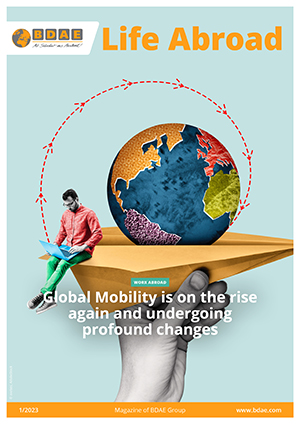International Women's Rights Day: Here's what the situation will be like for women worldwide in 2023
Like every year, International Women's Rights Day is celebrated around the world on March 8th. Let's take a closer look at whether this is really cause for celebration.
By definition of the European Institute for Gender Equality (EIGE), equality means that everyone, regardless of their gender, has the same rights, duties, and opportunities. This does not mean that everyone should become equal, but that the rights, duties, and opportunities should not depend on whether one is born a woman or a man.
What does equality actually mean and why is it important?
Equality means considering the interests, needs and priorities of both women and men, while recognising the diversity of different groups of women and men. Gender equality is therefore not a women's issue but should concern both men and women and be addressed comprehensively.
In 2015, the United Nations set 17 goals for sustainable development in its 2030 Agenda. The fifth goal is gender equality. This goal aims to achieve gender equality and the empowerment of girls and women.
Gender equality is important. As an expression of social justice, it leads to equal participation in personal development opportunities and creates the freedom and social space to realise individual lifestyles.
This is the state of women's equality worldwide
Implementing gender equality is crucial, but it's a complex task. In several societies and nations, gender roles are firmly established due to historical, religious, or political reasons. Despite the enforcement of laws and promotion of gender equality, these traditional roles persist, creating obstacles. Statistical surveys also demonstrate this issue.
On the occasion of International Women's Day, we therefore want to take a look at current, worldwide studies on the topic of gender equality and highlight the strong regional differences.
Sweden leads Europe in gender equality
The EIGE Gender Equality Index is a policy tool that measures progress in gender equality in the European Union (EU) over time. Each year, the Index assigns a score between 1 and 100 to the EU and its Member States. A score of 100 means that a country has achieved full gender equality.
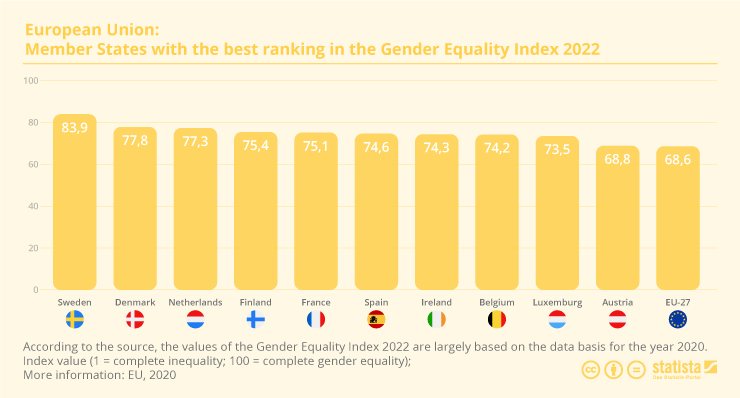
According to the index, Sweden scores 83.9 points in 2022, the highest level of equality among EU Member States.
The Best Countries Ranking 2022: Sweden at the top
Not only is the index evidence that Scandinavian countries are at the top of the rankings, but the news magazine U.S. News' "Best Countries Ranking 2022" also highlights this fact. In the category "Woman," Sweden claims the top spot as the most favored country in the world for women, followed by Norway, Finland, and Denmark. The ranking is based on the opinions of over 9,000 women and evaluates a country's popularity based on five key characteristics.
- Compliance with human rights
- Gender equality
- Income equality
- Progressiveness
- Security
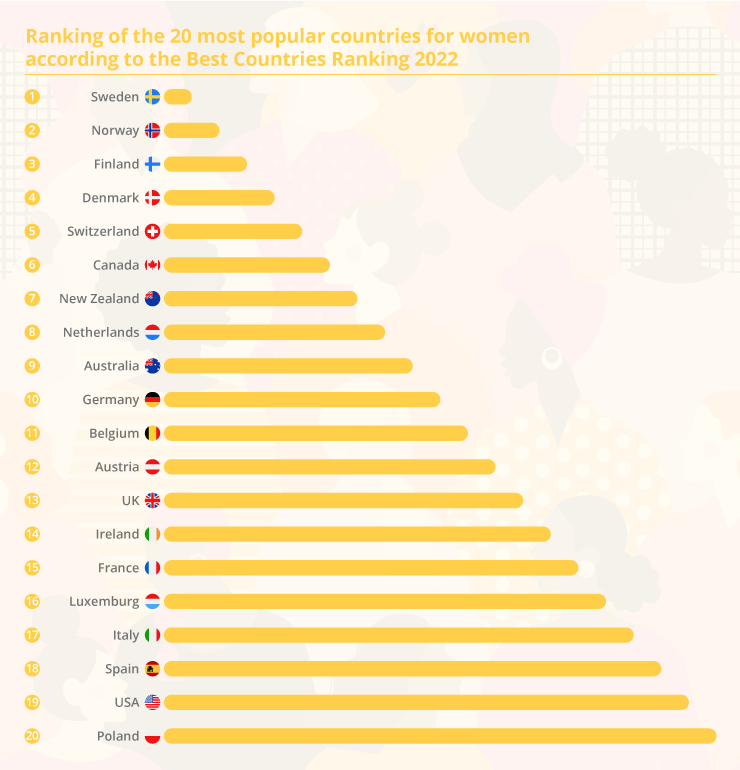
The survey included women respondents from various strata, including informed elites, economic decision-makers, and average citizens, across 36 countries in the Americas, Asia, Europe, and Africa.
The Woman in Work Index 2022
The annual Woman in Work Index, published by business consulting firm PwC, evaluates the employment status of women in 33 OECD countries by analyzing data from the Organisation for Economic Co-operation and Development. The index considers factors such as the employment rate, the gender gap in employment rate, gender-specific unemployment rate, percentage of women in full-time employment, and the gender pay gap, which is the difference in hourly earnings between men and women. Although the employment situation of women had been gradually improving, the Covid-19 pandemic caused a setback of at least two years in achieving occupational equality due to a significant rise in gender-specific unemployment and women dropping out of the labor force.
Women will only reach the same earnings level as men in 63 years
In previous years, the PwC survey showed a slow but steady improvement in women's employment in OECD countries. In the survey done in 2020, however, the index fell for the first time by different amounts in the individual categories:
- The female employment rate fell by one percentage point to 69 per cent
- The gender unemployment rate increased by one percentage point to 7 per cent
- The gender pay gap fell from 15 to 14 per cent.
There are many reasons for this decrease. For example, women often work in lower-paid jobs or reach management positions less often than men. Some also receive less money from their employer, although their job, education and employment history are comparable to those of their male colleagues.
The World Economic Forum's Global Gender Gap Report 2022 highlights how long it will take to close the gap.
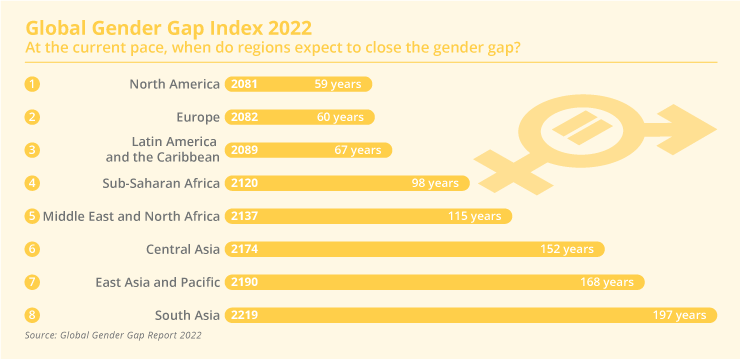
The best countries in the world for women
The Georgetown Institute for Women, Peace and Security aims to promote stability, peace, and equality globally by investigating and highlighting women's role in peacebuilding and economic development. Every year, the Institute releases the Woman, Peace, and Security Index, which is supported by the Norwegian Ministry of Foreign Affairs.
The 2021/22 index presents information on the world's top countries for women, among other things, distinguishing between those where women are included in public life and those where they feel isolated and unsafe.
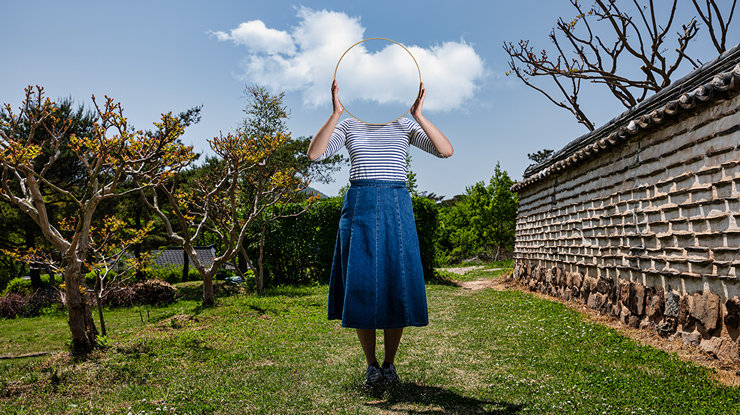 © Choi_ Nikolai, AdobeStock
© Choi_ Nikolai, AdobeStock
Among the top 10 countries, four are Nordic countries, with Sweden ranking seventh. The report attributes this to government policies that promote a model where both partners work and gender gaps in workforce participation are minimal in these Nordic nations.
10 The Netherlands
The Netherlands places great emphasis on women's rights and makes it a cornerstone of its policy. Its people are dedicated to enhancing the lives of women both on a national and a global scale. They implemented campaigns and laws that surpass those of many other nations in terms of advancing women's empowerment and rights. The Netherlands has made significant efforts to eliminate traditional gender roles commonly associated with nuclear families. Women in the Netherlands are exploring ways to enhance their financial independence and provide for their families, aided by their improved integration into the labor market and government institutions.
9 The United Kingdom
The UK strongly advocates for women's rights and empowerment through its many programmes to educate girls and prevent sexual violence. Founded in 2015, the Women's Equality Party brings together people of different genders, ages, backgrounds, nationalities, views, and experiences with the common goal of ensuring that women have the same rights and opportunities as men so that all can flourish.
8 Austria
Austria continues to promote gender equality and women's empowerment by executing various initiatives. The National Action Plan for the Protection of Women from Violence, instated in 2014, is still being enforced. To counteract hate speech, cyberbullying, and non-consensual sexting, Austria passed new laws in 2016 on sexual harassment and added a clause on cyberbullying called the "Initiative against Online Violence." Moreover, the all-day school program, designed to promote work-life balance for both genders, will be extended by doubling the number of spaces in all-day schools by 2025.
7 Sweden
Sweden has been a vocal advocate of gender equality for a long time. In Sweden, the fundamental principle is that every individual, regardless of their gender, should be able to work and earn a living, balance work and family life, and live free from any form of abuse or violence. Gender equality encompasses more than just achieving parity in male and female representation across all sectors of society. It also entails ensuring that the knowledge and skills of both men and women are utilized in every aspect of society.
6 Switzerland
Switzerland has taken significant measures to establish gender equality and safeguard women's rights within its new institutional framework, as directed by the 2030 Agenda. The enhancement of women's empowerment, gender equality, and the reinforcement of their rights are integral components of Switzerland's fresh Sustainable Development Strategy. The Swiss International Cooperation's Dispatch designates gender equality and women's and girls' rights as a fundamental cross-cutting theme and one of its seven strategic goals. To achieve gender equality, strategies have been developed and put into action to distribute unpaid care work equally between men and women.
5 Luxembourg
Luxembourg is committed to creating a society without gender stereotypes and actively promotes gender equality in all areas of life. The country has legislation in place that emphasizes equal pay and combats domestic abuse and gender stereotypes. Luxembourg is also the only country in the European Union that has a ministry solely focused on gender equality, which primarily works towards legal and practical gender equality objectives.
4 Denmark
Denmark places great importance on gender equality, with a female minister for gender equality typically present in the government coalition. Women in Denmark are well-represented in the economy, while men are active in childcare. Denmark's policies, such as extensive parental leave and tax-subsidized childcare, encourage women to pursue careers while raising a family. Women are also well-represented in the government, with around 40% of members of parliament and many ministerial posts held by women.
3 Iceland
Iceland values gender equality and has implemented laws to ensure it is upheld. The Gender Equality and Equal Rights Act specifies that no public body, government council or committee may have a gender ratio of less than 40%. Additionally, all companies with more than 25 employees are required to have a gender equality program that is reviewed by law every three years.
2 Finland
Finland has a strong history of gender equality, being the first country in Europe to grant women the right to vote and stand for election in 1906. Finnish women have equal access to education and healthcare and are well-represented in the workforce. This is partly due to policies that provide low-cost, high-quality childcare, work-life balance initiatives and equitable distribution of family leave among parents. Discrimination based on gender, gender identity, and gender expression is illegal.
1 Norway
Norway is often considered one of the most gender-equal countries in the world. The country's focus is on expanding opportunities for women and girls, promoting their right to self-determination and empowerment. Additionally, Norway is committed to promoting gender equality globally and has agreed to all human rights treaties and international conference agreements that aim to eliminate gender discrimination and gender-based human rights violations.
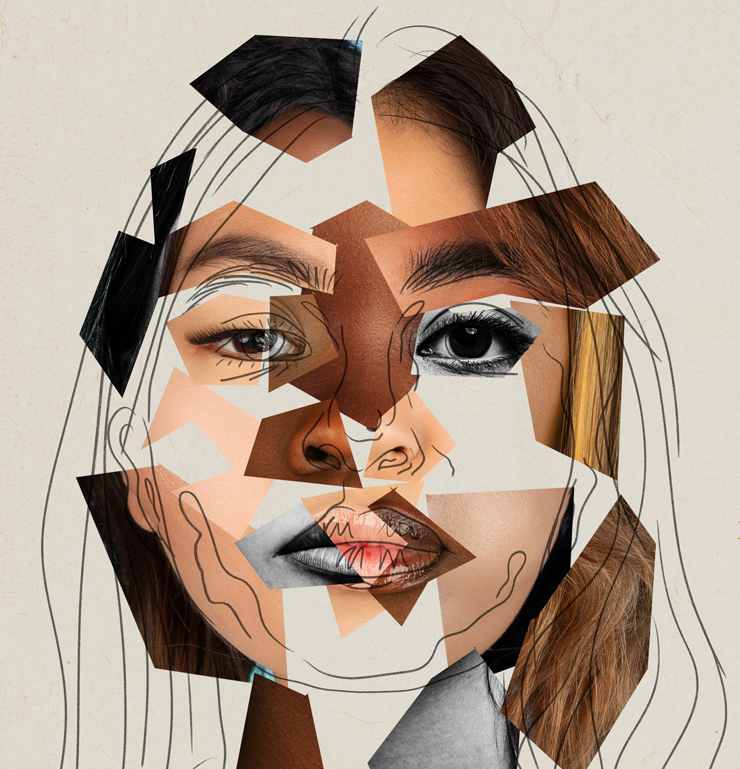 © Lustre, AdobeStock
© Lustre, AdobeStock

